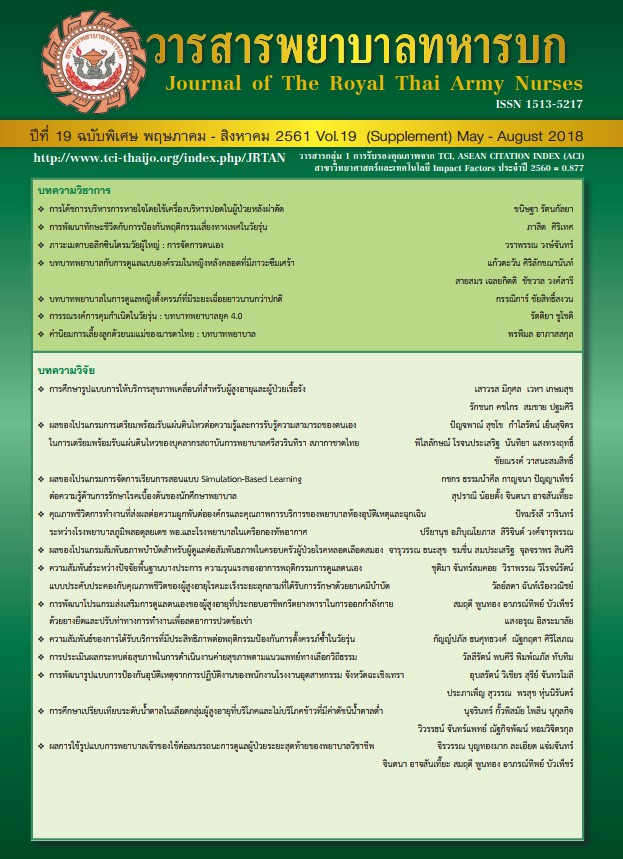Metabolic Syndrome in Adult: Self-Management
Keywords:
Metabolic Syndrome, Adult, Self-managementAbstract
Human beings are considered the most valuable resource contributing to a nation’s sustainable development. Creating high quality human resource with intelligence and essential skills, who are physically and mentally healthy and responsible to their work and health, is necessary to help prevent non-communicable diseases, which is one of the main health concerns at present. It is, therefore, an approach towards a sustainable prevention of communicable diseases, health promotion and healthy living and overall well-being of people in the 21st Century.
Downloads
References
Public Health; 2013. (in Thai).
Chanapa P & Kijkuokool P. Stress and The Metabolic Syndrome. Songkla Med J, 2013; (5): 253-259.
Grundy SM, Brewer JB, Cleeman JI, et al. Definition of metabolic syndrome : report of the National Heart, Lung and Blood Institute/American Heart Association Conference on scientific. Issues related to definition. Circulation, 2014; 109: 433-438.
International Diabetes Federation. The IDF concensus worldwide definition of the metabolic syndrome. Belgium: International Diabetes Federation, 2009.
Sampoangern N & Chartprasert D. Influences of Risk Perception on Health Behavior and Connunication Guidelines for Preventive Behavior on Non-contagious Syndromes of Risk Group. Journal of Public Relations and Advertising, 2014; 7(2): 38-58. (in Thai).
Comier MA, Dabelea D, Hemandez TL, Lindatrom RC, Amy J, Steig AJ, Stob NR, Pelt REV. & Eckel RH. The metabolic syndrome. Endocrine Reviews, 2008; 29(7): 777-822.
Fredrick TS, Baby boomers court metabolic syndrome bulging middle-aged and oder adults beware. ics, Geriatrics, 2009; 64(9): 8-15.
Rattanahirunsak C, Pakdeevong N & Binhozen V. Association between Health Behaviors and Metabolic Syndrome of the Employee in One Private Hospital. Apheit Journal, 2015; 4(2): 64-65. (in Thai).
Boonnarakorn S. Enhancing the health of all ages. Songkhla: Tain printing. 2008; 205-244. (in Thai).
Le More P & Burke KM. Medical surgical nursing : Critical thinking in client care, 1996. New York: Addison-Wesley.
Suwankruhasn N, et al. Effects of a Selfmanagement Support Program for Thai People Diagnosed with Metabolic Syndrome. Pacific Rim Int Nurs Res, 2013; 17(4): 371-383.
Ekwueme DU, et al. Health and Economic Impact of Breast Cancer Mortality in Young Women, 1970-2008. American Journal of Preventive Medicine, 2014; 46(1): 71-79.
Tokunaga M, Takahsi T, Singh RB, Rupini D, Toda E, Nakamura T, et al. Diet, nutrients and non-communicable diseases. The Open Nutrceuticals Journal, 2012; 5: 146-159.
Health Education Division. Guidelines for the implementation of health behavior change at provincial level. Nonthaburi: Department of Health Service Support. Ministry of Public Health; 2013. (in Thai).
Petpum J. Health Behavior, concepts, theories, and applications. Phitsanulok: Naresuan University Pubblishing House. 2017.; 101-102. (in Thai).
Panitchakul K and Sumraanbua A. ApplIcations of behavior modification model (Trantheoretical Model) to promote exercise behavior. The Journal of Boromarajonani College of Nursing Nakhonratchasima, 2013; 19(1): 66-76. (in Thai).
Wongchan W. Development of Self Health Care Model for Pre-retirement Teachers. [Doctoral dissertation]. Bangkok : Chulalongkorn University, 2013. (in Thai).
Devision of Physical Activity & Health, Department of Health. Promotion of Physical Activity in Working age. Nonthaburi : Ministry of Public Health; 2016. (in Thai).
Creer LT. Self-management of chronic illness. Handbook of self-regulation, California: Academic, 2002; 601-629.
Kanfer F. Self-management methods. In F. Kanfer & A. Goldstein (Eds). Helping people change : A textbook of methods, (3nd ed., p. 283-338) 1988; New York: Pergamon Press.
Nansuphawat A & Sathapornpat P. Conpetency and Roles of Health Promotion among Nurses in Tertiary Hospitals. Journal of The Royal Thai Army Nurses, 2017; 18(1) : 222-228. (in Thai).
Wattana C. Self-management Support : Strategies for Promoting Diseases Control. Journal of Phrapokklao Nursing College, 2015; 26(1): 117-127.
Praphasil O, Wattana C & Tharavanij T. (2556). Effects of Promoting Self-Efficacy in a Self-Management Program on Self-Management Behaviors, Obesity, Cardiovascular Disease Risk, and Regression of Metabolic Syndrome among Persons with Metabolic Syndrome. Nursing Journal, 2013; 40(1): 34-48. (in Thai).
Downloads
Published
How to Cite
Issue
Section
License
บทความหรือข้อคิดเห็นใดใดที่ปรากฏในวารสารพยาบาลทหารบกเป็นวรรณกรรมของผู้เขียน ซึ่งบรรณาธิการหรือสมาคมพยาบาลทหารบก ไม่จำเป็นต้องเห็นด้วย
บทความที่ได้รับการตีพิมพ์เป็นลิขสิทธิ์ของวารสารพยาบาลทหารบก
The ideas and opinions expressed in the Journal of The Royal Thai Army Nurses are those of the authors and not necessarily those
of the editor or Royal Thai Army Nurses Association.






